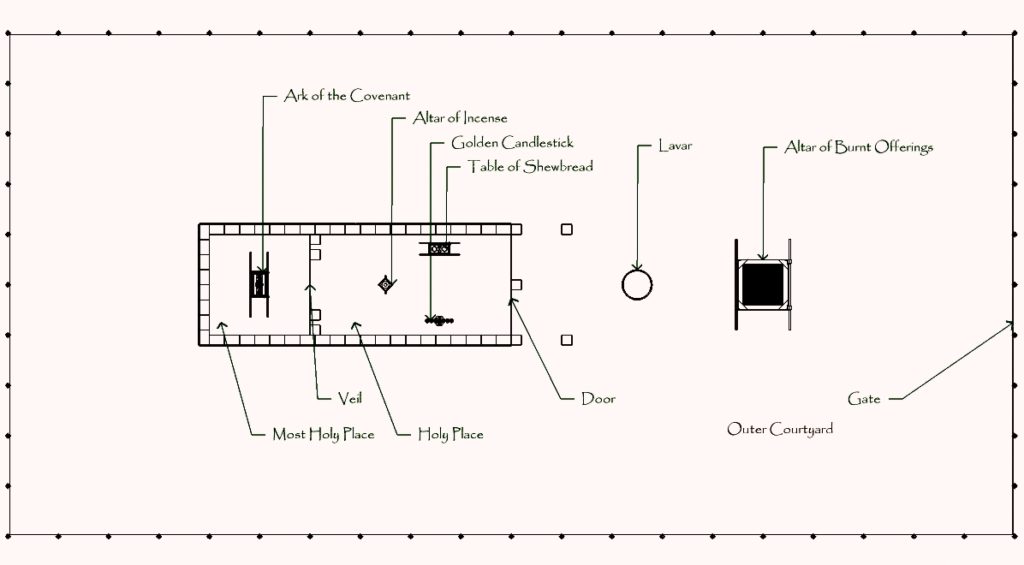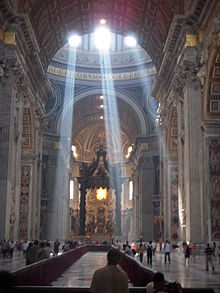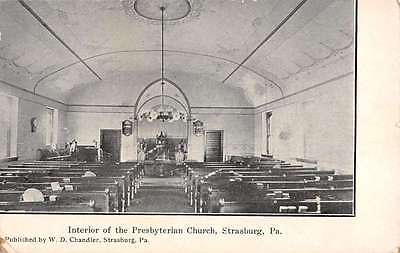Year: 2018
May 15, 2018: Day 31 – Exodus 31
May 18, 2018No one should ever think that only those up on the pulpit area are called by God to do God’s work. Did you notice in this chapter how the Lord spoke to Moses and drew out Bezalel and filled him with the Holy Spirit in order to increase his ability, intelligence and knowledge so that he would be the best there could be in making those things that have been mentioned earlier? As Presbyterians we believe that everyone is called to the work that they have. There is no higher calling. There are callings, and all of these callings have been instituted by God for the sake of the kingdom of God. This certainly is being played out here in this chapter.
There is a transition then from the gifts and the skills of the people of Israel to create that which God has commanded them to create in order to worship Him appropriately, to singling out the Sabbath Day as a commandments that not only has to be respected, but has to be followed to the letter of the law. A few times we read that those who do not follow the Sabbath shall be put to death. I’m not sure you heard that, but I know I was given a hard time early on when I first moved here and I mowed my lawn on a Sunday. So much for a hard time, Exodus says the person who does not obey the Sabbath should be put to death.
At the end of this chapter we see God handing over to Moses the tablets of stone upon which God Himself had written with his finger. That’s pretty descriptive, and you can almost see the hand of God writing those commandments upon those stone tablets.
May 14, 2018: Day 30 – Exodus 30
May 14, 2018What do we today to provide the same kind of detail to our worship of God? I would say nothing even comes close to what we read in Exodus. We celebrate our Savior Jesus Christ, but the time and the effort that it took to make sure that the priests had what they needed to make appropriate offerings was way beyond what is prepared today. We spend time preparing for Sunday, we pray over the Scripture and ask for guidance in the other elements of worship, but the details which are provided here are off the chain. They are simply exaggerated, but it was what was required.
Notice that there is a church tax. Not so long ago in Germany there was a church tax for the German Unified Church which the state collected. If you were on the rolls of the German Church then a tax was collected from you which went to the church. That hasn’t been around for a few decades now, but it is recent history. In Italy there is a certain amount of government money that goes to charitable organizations and when you vote you can designated to whom they will go, and the churches are included in those organizations. The funds have to be used for social ministries, but I like that. That seems to make more sense than the German model.
May 13, 2018: Day 29 – Exodus 29
May 14, 2018So this is the ordination service of Aaron and his children, but primarily Aaron. I’ll never forget my ordination, I know, it isn’t about me, but it is interesting how different ordination services are today as opposed to how they were back then. I can safely say that no animals were sacrificed at my ordination. But there was laying on of hands, just as there is here in Exodus. It is important to note how important the priesthood was seen in the Hebrew community. I would argue that when you find yourself in a theocracy that the priest is the most important player in the community.
It is interesting that the role of pastor has diminished in society these days. The pastor used to be the first person who was approached for counsel for any issues that society may have faced, that families may have faced, that businesses may have faced. There was a sense that when you needed a disinterested voice, then the pastor was the person you wanted to contact. That simply is not the case anymore. I rejoice when I am called and asked for insight, but even in my 20+ years I am noticing that it is happening less and less. That makes me a bit sad.
May 12, 2018: Day 28 – Exodus 28
May 14, 2018We need to define some terms here. First of all, notice how Aaron as the priest is given vestments to wear. These vestments were to set him apart. I like the bells that he had on his vestments which were on his robe so that he would not die. Remember Zecharia, the father of John the Baptist, who was in the temple and the people were wondering why he was taking so long? They may not have heard the bells ringing which signified that he was wandering around in the areas where only he could go. If you were to see the face of God you were supposed to die, so the bells might warn God that you were on your way. Yeah, that’s probably not it.
I actually prefer to wear a robe in worship. I remember trying to wear jeans for our second service and it just didn’t sit right. I still don’t like the suit as much as the robe. It doesn’t go back to Exodus for me, but it does go to the place where when I wear the robe it hides me, because it simply is not about me. For Exodus in this Scripture it was a matter of setting Aaron apart and his role as priest. That isn’t what I’m interested in, but I am interested in people not seeing me but rather the Lord coming through what I say and what I do. A robe could limit distractions.
Now some definitions. The ephod is a sleeveless vest which was decorated and adorned with all sorts of jewels and other distinguishing features which were very valuable. The Urim and the Thummim are thought to be objects that were used to understand what the will of the Lord might be. For example, even today some churches use lots to understand what God’s will might be. So they could be lots, they could be other instruments of discerning God’s will as well.
May 11, 2018: Day 27 – Exodus 27
May 13, 2018We have more details about the tabernacle, and they continue to be impressive. But notice how this chapter ends. We find ourselves with the name of Aaron being mentioned who was given the responsibilities of the priesthood, so this whole tabernacle thing was right in his wheelhouse. The lamp that is lit for the tabernacle is mentioned and we hear that it should always be lit. They are to use olive oil to keep it lit, pure, extra extra virgin olive oil.
There are some traditions where you see a lamp lit to signify the presence of the Lord. I think of the Roman Catholic tradition where you have the lamp lit to signify that the host is present. The light signifying the presence of the Lord for the Israelites is not unusual. We saw that in the night as they made their way out of Egypt the Lord lead them in a pillar of fire. This lamp which had to be tended day and night served as a reminder that the Lord was present in the tabernacle in the same time frame: day and night.
May 10, 2018: Day 26 – Exodus 26
May 10, 2018Again, there is a lot of detail, but focus on where the ark of the covenant was to be placed. Look at vs. 31-34 and you will see that the ark is at the center of all things because that is where God’s power and law were placed. There is a separation between that and the rest of the population because the presence of the Lord was to be feared and had the power to give life…and death.
Okay, this is just a fictitious rendering of a story that never happened, but the power of God could be something like this. The details reminds us that when we are in the presence of God, which is always, all things matter down to the last detail.
May 9, 2018: Day 25 – Exodus 25
May 9, 2018
What you have before you is the pre-temple place of worship. The detail that went into describing what had to be done to prepare this place is amazing. Most of what you have before you is made out of gold, and silver, and bronze. The chapter begins innocently enough as we see that Moses is asking the people to contribute and give gifts. The assumption is that most of what they have is a result of their plunder of Egypt on their way out. Remember that part in chapter 12:35 that they took from the Egyptians on their way out silver and gold.
What you see described above had to be moved every time the people of Israel moved. That was not an easy feat. The enormous decadence of what is being built never ceases to amaze me. Remember, it wasn’t a problem. The Israelites were living together and had all things in common. There was no upper and lower and middle class. They had all things in common and lived in common. Not so for today. So when we see a structure like the one below, or the other one below, we have to ask, what would it look like if we worshiped in places that did not require extravagant cost and that these funds could be used for the poor. I think the words of Jesus in Matthew 26:9 give us pause in addressing this question too glibly.


May 8, 2018: Day 24 – Exodus 24
May 9, 2018This is a very significant chapter for a whole variety of reasons. Look at the beginning 8 verses which show the meticulous care that Moses had for his people. He established pillars for each tribe where they could worship their Lord and their God. He did not leave them without an opportunity to worship God and to allow the people to fulfill their responsibilities of worship to God. The golden calf example should be even more shocking as a result of this chapter. It isn’t as if God left them with nothing. He had prepared them for his time up the mountain.
Some of the details that we may have missed in this story because we think we know it so well. Notice who goes up the mountain with Moses and who stays behind. Joshua goes up the mountain with Moses (vs.13). God has been preparing Joshua for quite a long time to take over for Moses, even before he was given the task after the people are disobedient to the Lord. It also places him outside of the group who disobeyed the Lord. God prepares us for what our next step will be even before we know what that step will be. I know that there are many times in my life when I can look back and think: I am so grateful that I had a certain experience because God has prepared me through that experience for today. God is always at work.
Notice how long Moses is up the mountain. This example of forty days and nights is the same time period that we have for the flood. It is the same number, except in years, that the people of Israel are banished to the wilderness. Later in the New Testament it is the same amount of time that Jesus spends in the wilderness. The similarity to that event is significant. God was up a mountain receiving the law from the Lord. Jesus was in the wilderness preparing himself, as Lord, for a life of ministry to the people. That wilderness experience and those forty days are formative for both Moses and Jesus.
May 7, 2018: Day 23 – Exodus 23
May 8, 2018I was struck by the statement in vs. 3 that “you shall not be partial to the poor in a lawsuit.” Now, I always thought that we were supposed to be partial to the poor, but keep in mind that this deals specifically with lawsuits and the law. I guess the concept was that if a poor person did something illegal, you do not deal less severely with them strictly because they are poor. I still believe that Jesus has a preference for the poor. Remember he said: blessed are the poor. We never hear him say: blessed are the rich.
But the laws and the mandates go on. Be nice to the livestock of your enemies. Don’t take bribes. Observe the Sabbath. Celebrate three holy days: Festival of unleavened bread, Festival of the harvest, Festival of the ingathering. All of this is for thee purpose of giving thanks for the grace and the protection of our God. This is crucial for us as well, that we do not forget to celebrate and give thanks for the presence of our Lord.
Finally he tells the people that they will take over the land of Canaan. Did you notice that he says that it is not going to happen all at once. It will happen gradually, because if you take over the land all at once, you don’t have the people to populate the land and wild animals will run a muck. That is a conquest theory that I have not heard before. Don’t annihilate all of your enemies at once out of fear that wild animals will take over the territories where they once lived.
His primary focus on the conquest of these lands is that the people of Israel would never worship the gods of the lands that they conquer. Always focus your worship and your praise on the God of Abraham, the one and only true God.
May 6, 2018: Day 22 – Exodus 22
May 8, 2018I’ll guess I can encourage you not to apply all that you read in this chapter literally to your life today. Just think what the people of Israel were going through as they were making their way toward the promised land. Notice that there is no mention of land law, because no one owned their land at that time. They do speak about land in the way that produce and crops are mentioned, so it is interesting that these laws are in place as they make their way across the land. It was all in relationship to those things that you may have as you were making your way across in a caravan. This is really, in some ways, gypsy law. I say that having been involved in ministry with gypsies, which we should really use the term Roma.
Each Roma community has its own set of laws and rules by which each person must abide. There is a general consistency in all of them when you go from community to community, but it is not perfectly uniform. Here in chapter 22 we find the emphasis is placed on animals and daughters. He doesn’t match them up as equal, but there is mention of both here. I like vs.25-27 which speaks against loaning money on interest. He specifies specifically that if they are poor you are not to request interest from them. There is a specific mention of the poor.
There is a sense in this Scripture that we are all in this together and sometimes mistakes happen. When they do happen, you have to make it right. It was crucial for the community to know what should be done when certain things happened so that everyone was on the same page. I also think it is quite horrific that if a young woman is raped then she must marry the man who raped her. But remember, back then if a woman lost her virginity, by rape or not, then she was no longer considered of value to anyone. I did not make this up, it is written here. As a result these laws in reality protected women from being tossed out into the street without anyone to take care of them.